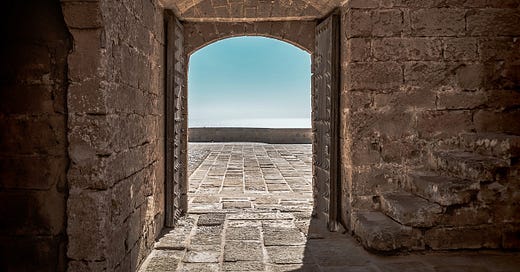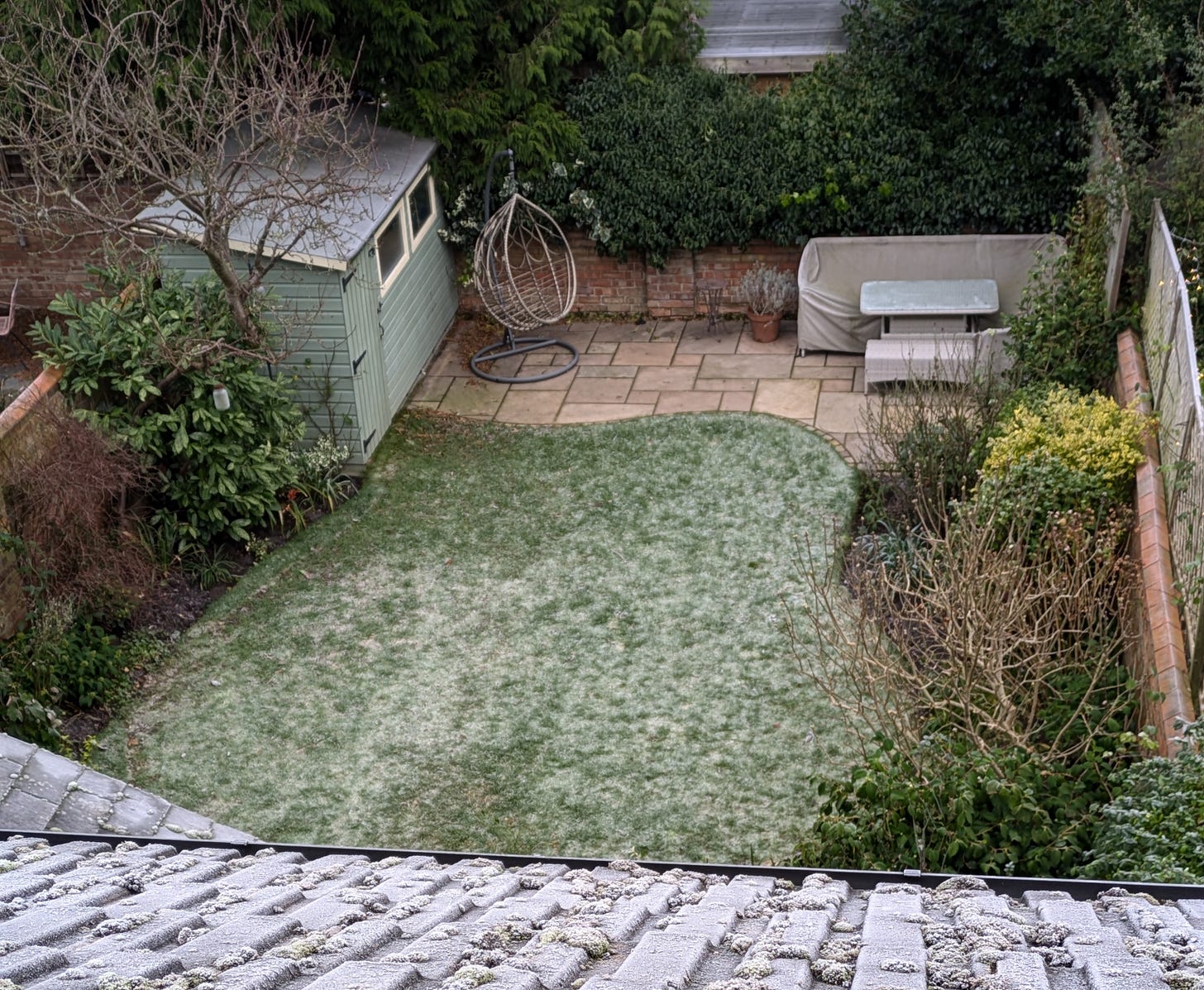Standing in the Doorway of the Year - Part 1
Why I'm embracing January as New Year's Month (and why it's totally fine if you don't want to do the same).
A couple of weeks ago I couldn't sleep and my mind (bizarrely) turned to wondering why on earth December is the 12th month and not the 10th as its etymology would suggest (“decem” is Latin for 10).
Tom was also awake so I asked him if he’d ever noticed this. He mumbled that he had, which didn't surprise me because his general knowledge is ridiculously good but was mildly invalidating because, when your mind has been completely blown by something, it's always a bit of a let down when you share the news with your husband and they respond with "yeah, I know" (that said, he was also trying to get to sleep and who wants to be kept awake by their spouse enquiring about their general knowledge?).
Usually, these late night wonderings are of interest to me only late at night and I don’t follow up in the morning but, this time, I did. Since then, I've been down a rabbit hole and I'm now a little unsure how much to tell you because I've lost all perspective on how objectively interesting any of this actually is.
Perhaps it's best to keep it simple and begin with what you've probably already guessed which is that, originally, December was the 10th month of the Roman year. An evolution of the ancient Greek calendar, the first Roman calendar had 10 months and only 304 days. It began in the spring with Mensis Martius (March) and ended in Mensis December. Some scholars think that, during the winter, there followed an undefined span of undated time before the next calendar year began in spring.
This calendar didn't last long as Rome’s second king, Numa, added 50 extra days and borrowed 1 day from each of the existing months to create the two additional months we now know as January and February. Some say he also established 1st January as the beginning of the new year but others say that this did not happen until 46 BC when Julius Caesar made further adjustments to the calendar to bring it more in line with the sun. Until then, the Roman calendar had been lunar and would regularly fall out of rhythm with the seasons it was meant to mark. For a while, the Romans even had an extra month named Mercedonius (Latin for “Work Month”) every 2-3 years to bring things into better alignment with the seasons.
Here’s the thing that really amazes me, though: 1st January was not consistently celebrated as New Year’s Day in Britain or her American colonies until 1752 when the Calendar Act of 1751 changed the start of the legal year from 25th March to 1st January. Although Pope Gregory had established 1st Jan as the beginning of the year in 1582, this had only been adopted by Catholic Europe not Protestant Europe. That means New Year’s Day has only been celebrated on 1st January 273 times. New Year’s Day, as we know it, is really quite new.

Take from all this what you will but I wonder if the shifting of New Year’s Day gives us a bit of creative license to consider a different season or date the beginning of our year. If you are in the Northern Hemisphere and it makes more sense to you to begin a new year when nature’s energy levels are rising in spring maybe you might want to wait until you see daffodils before considering your new year’s resolutions. Or perhaps there is another time of year that feels more appropriate to celebrate as the beginning of a new year. I did some research and, once again, I was blown away by the many different cultural and religious approaches to marking time and dating the passage of the year. The fact is that it’s a relatively recent and arbitrary development to begin the year on 1st January and if another time of year feels more appropriate to celebrate as the start of the year, go for it, I support you.
Even still, I won’t be joining you because, now I’ve reflected on it (possibly too much), I’m actually happy to go along with the current convention for beginning a new year in January.
Partly that's because I really like the etymology of January. The word is derived from the Latin Januarius which translates as “month of Janus”. The Roman god of beginnings and endings, Janus is usually depicted with two faces, one looking backwards and the other forwards.

While I don’t share the Roman belief in the god Janus, I do wholeheartedly believe that endings and beginnings are sacred and it makes sense to me that the Romans would have wanted assign them a god. In particular, I believe that the space between an ending and a beginning is sacred. These are the liminal times in life that crack open the status quo, sever us from repetitive patterns and offer us the possibility of something new. It's not exactly that we're more open to what's new during these times (although we may be) and it’s certainly not the case that we’re always excited or happy about being on the cusp of something different (it’s often very painful) but, mysteriously, in the unsettling of change we become unstuck from our default settings. We may have more awareness of possibility, or a desire (or need) for deeper, wiser voices than the usual ones we let speak into our lives, or we may just be aware that the status quo is now inadequate or lacking. I’m guessing you can think of an example - either from your own experience or someone else’s. Sacred texts, including the Bible, are full of examples of people being more available to the promptings or movement of the Divine when caught in the between space of an ending and a beginning (Moses in the desert, St Paul after his blinding on the Damascus road, Jesus in the tomb).
We don't usually choose to enter liminal space but it's good for us to get comfortable with blessing these times as sacred. I wonder if January invites us to do just that. Janus was also the god of doorways and I like the idea of January as the doorway of the year - a threshold space for us to stand while we look both backwards at the past year and forwards to the year ahead. I like the implicit invitation to take a whole month to practice lingering in the liminal space of being between an old year passing and a new year emerging as we wait on the mysterious nudgings of a deep knowing that we can't hurry but we trust (or hope) will come at the right time.
We don't usually choose to enter liminal space but it's good for us to get comfortable with blessing these times as sacred. I wonder if January invites us to do just that.
Standing in the doorway of the year also seems to fit with the invitation of winter. It might be a controversial opinion but I think of winter as the most liminal of all the seasons of nature. Winter is the hinge between two cycles of growth, an exhale between autumn and spring. This is the time for gardeners to reflect on what grew well and what did not and to make plans for this spring’s plantings; it's also a good time for us to reflect on and plan for the garden of our lives.1 None of this can be rushed. In the past, I’ve found January boring, miserable and bleak but now I wonder whether that was more because I didn’t know how to slow down or rest. The more I lean into pacing my life according to nature’s seasons, the more each season offers its gifts. Winter is for hunkering down, becoming still and - gently - looking inward. It’s for remembering, pondering and dreaming. Life might not allow us to embrace that fully (mine doesn’t) but perhaps there are small ways we can leave margin for rest and reflection, for lingering in the doorway of the year.
If you’re reading this in the southern hemisphere I hope you’ll forgive me for waxing lyrical about the benefits of beginning a new year in the winter. I've only celebrated one New Year’s Day in the southern hemisphere (I was backpacking around Australia) and I do remember enjoying the energy of summer coinciding with the beginning of a new year. That said, I was also 19 years old and had high(er than now) energy anyway. If you’re in the southern hemisphere this January, I’d love to know how you feel about beginning a new year during summer. I’d also love to hear from you if you mark the beginning of a new year at a different time of year.
Whichever hemisphere you're in and whether or not you feel this season is the right time for the new year to begin, I hope that this month might offer you some time to attend to what is ending and what is beginning, both in you and in the world around you. You don’t need to leap into the new year or start the year strong. It’s enough to linger in the doorway of the year.
I'll share some of my favourite reflection practices and processes in my next letter. I originally added another couple of sections to this email but it made it very long. Overly lengthy emails do not feel very compatible with gently lingering in the doorway of the year so I’ll save the rest for next time! Until then….








I love this idea of January being a space to look back and look forward. A time to step back from the endless busyness and recalibrate. I shall re think my negative views of the month!